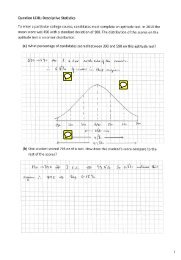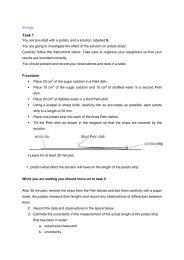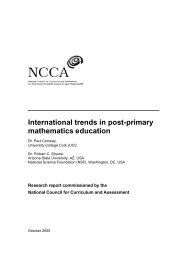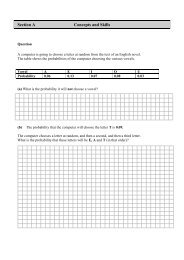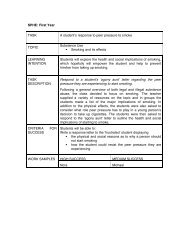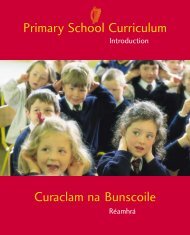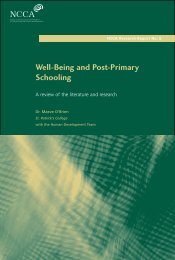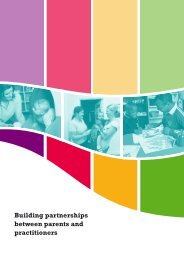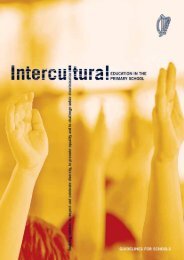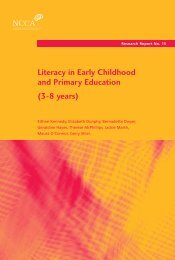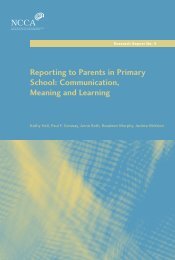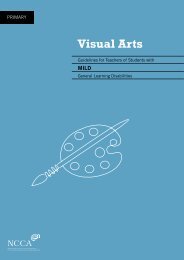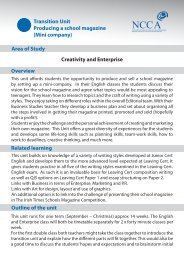Up and Away - National Council for Curriculum and Assessment
Up and Away - National Council for Curriculum and Assessment
Up and Away - National Council for Curriculum and Assessment
You also want an ePaper? Increase the reach of your titles
YUMPU automatically turns print PDFs into web optimized ePapers that Google loves.
14<br />
4. School – home communication<br />
It is important to make invitations, letters, notices of events, <strong>for</strong>ms, procedures, etc. as clear as possible<br />
<strong>for</strong> parents who have little English. Time <strong>and</strong> thought should be given to find the best means of<br />
communicating with consideration given to the effective use of visuals through pictures, clipart, <strong>and</strong><br />
website images. Invitations, letters, <strong>for</strong>ms <strong>and</strong> so on can also be made underst<strong>and</strong>able by getting another<br />
parent who speaks the language to explain.<br />
Improving school – home communication can be achieved in a number of ways.<br />
Use visuals:<br />
For clear enrolment procedures <strong>and</strong> <strong>for</strong>ms.<br />
For clear invitations to parent teacher<br />
meetings.<br />
For reports.<br />
For clear invitations to school events – plays,<br />
Christmas party, school open day, carol<br />
service, etc.<br />
In a picture-based booklet about the school<br />
giving in<strong>for</strong>mation about times, routines,<br />
schedules, etc.<br />
For regular bulletins on all aspects of school<br />
life.<br />
School letters <strong>and</strong> notes, including notes<br />
about the work being done with the pupil in<br />
class.<br />
The language support teacher can help<br />
communication by:<br />
Attending school occasions <strong>and</strong> events.<br />
Meeting newcomer parents on an in<strong>for</strong>mal,<br />
open-door basis.<br />
Greeting newcomer parents as they drop <strong>and</strong><br />
collect their children.<br />
Encouraging newcomer parents to use the<br />
language support room as a meeting place.<br />
Explaining school letters <strong>and</strong> notes.<br />
Using the school newsletter as a resource in<br />
class so that pupils can tell their parents.<br />
Organise:<br />
Regular meetings between individual parents,<br />
the language support teacher <strong>and</strong> the class<br />
teacher.<br />
In<strong>for</strong>mal meetings, or coffee mornings, with<br />
all newcomer parents. These are invaluable<br />
<strong>for</strong> gradually in<strong>for</strong>ming parents about<br />
education in Irel<strong>and</strong>, their child’s progress <strong>and</strong><br />
the expectations of the school.<br />
Monthly open afternoons <strong>for</strong> parents to view<br />
their child’s work (using the European<br />
Language Portfolio) <strong>and</strong> to discuss progress<br />
with the language support teacher.<br />
Meetings between representatives of, <strong>for</strong><br />
example, the local Muslim community <strong>and</strong><br />
new Muslim parents.<br />
A visit to the local mosque followed by lunch<br />
there.<br />
A session with a local librarian on how to use<br />
the library.<br />
Also:<br />
If possible, translate in<strong>for</strong>mation booklets<br />
into the languages of the newcomer parents.<br />
When necessary use in<strong>for</strong>mal interpreters to<br />
support communication.<br />
Access newspapers <strong>and</strong> books in different<br />
languages to be made available to newcomer<br />
parents.<br />
Remind mainstream teachers to make extra<br />
time <strong>for</strong> parents who have difficulty<br />
communicating fluently.<br />
Communicate regularly with the home-school<br />
liaison teacher.



